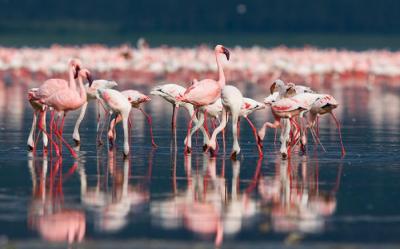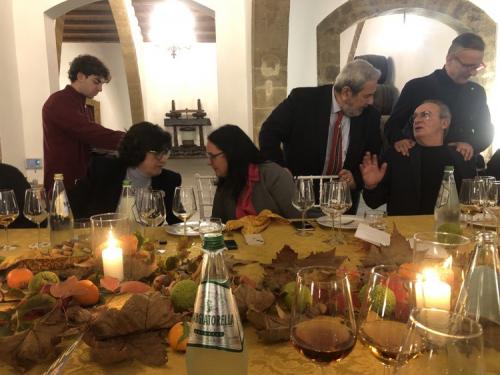Trapani’s UNESCO bid underlines burgeoning tourist attractions of secret Western Sicily

MARSALA – Sicily’s least-known province of Trapani, once home to a flourishing British community of merchants selling Marsala wine to Horatio Nelson’s Royal Navy fleet, is poised to lure more discerning tourists from the UK and the United States to visit attractions such as the dazzling salt lakes built by the Phoenicians, for which local authorities are seeking UNESCO world heritage status. The stunning spectacle of migrant flamingos hovering over the lakes in search of a fish supper is just one of a constellation of marvels in enchanting Western Sicily including a new luxury hotel boasting Italy’s first salt therapy swimming pools, year round sunshine and mild climate, beaches at San Vito lo Capo and the Egadi islands, the ancient ruins of Segesta and Greek temples in nearby Agrigento and culinary delights such as couscous and cannoli washed down with the famous Marsala wines produced by the historic Florio winery.
Tourism in Sicily has been booming in the past two years though the bulk of foreign visitors focus on the areas around Catania including long established resorts at Taormina and Giardini Naxos nestling under the Etna volcano. A conference on “Transversal Tourism” and the need to celebrate the Winter Solstice held under the auspices of the Trapani Chamber of Commerce in the port city last week end unveiled plans to bolster infrastructure in western Sicily to provide more options for tourists who want a change from the sky high prices often charged at hotels and restaurants in eastern Sicily. New rail connections are planned from Trapani’s recently opened Bighe airport to the island capital Trapani while the Seawater Hotel Bio & Beauty Spa features accommodation with a seasonal outdoor swimming pool, free private parking, a garden and a shared lounge. Airports at the nearby islands of Pantelleria and Lampedusa provide other gateways from Rome and Milan to the region.
On the fringes of the conference participants were hosted amid the huge barrels of the Florio winery where sommelier Giada di Girolamo recounted the genesis of the business with the British Woodhouse and Ingham families who established a flourishing anglo Saxon colony in Marsala in the early 19th century as the Sicilian liquor wine was bought in large quantities by Nelson’s fleet to assuage the immense thirst of its sailors on their way to enjoy the fleshpot of Naples between battles against the French.
Florio’s masterly chef Peppe Giuffrè presided over a menu featuring artichoke tart marinated in virgin Marsala, timballo of ziti, a delicious tube shaped pasta wrapped in scrumptious pastry, tuna in veal sauce loved by the winery’s patriarch Ignazio Florio, the first entrepreneur to market tinned tuna conserved in olive oil. The banquet climaexed with a cassata cake created by the loquacious Giuffrè in front of diners in as little as 15 minutes.
The following evening young catering students in the hilltop town of Erice provided another exquisite meal at the state of the art institute training young chefs and sommeliers at the Istituto Superiore Ignazio and Vincenzo Florio. The Institute’s lycee of communication and Enogastronomic culture is conceived as a training ground for launching Sicilian excellence around the world.
Claudio Dario, a Venetian medical doctor who is president of the Seawater hotel, told the transversal tourism conference how its managers decided to stay open all year round given the attraction of winter sunshine for natives of chilly northern Europe. “Two days ago I was in the Veneto region where temperatures were 5 celsius,” he said, “now it is 15 degrees Celsius here in Sicily and the December average is 17 Celsius. When people come here just the sun gives them energy, also in the winter, a state of relative inebriation, a decidedly different mood, without drinking.”
“The Solstice of Winter in all archaic civilisations is a moment of rebirth opening the path to the solstice of the sun.”
Many visitors to western Sicily may be tempted to acquire a longer term base in the region as a holiday home or investment by taking advantage of the option in depopulated towns and village to buy a house or apartment offered by local authorities for a symbolic 1 euro. To find out more I rented a car for just 50 euros for a day from Marsala and drove through tranquil olive groves and vine-covered hills to the baroque jewel town of Sambuca in Sicilia, just 20 km from the seaside resort of Sciacca, where the third such scheme for selling 3 euro properties is due to be unveiled soon. Local estate agents Emanuele Fioricha, who also is deputy mayor of the resort town of Realmonte, and Franco Conti and their polyglot team at Immobiliare 2000 showed me a range of other cheap and tempting properties requiring restoration with purchase prices starting from as little as 20,000 to 35,000 euros https://www.immobiliare2000.com/property_area/sambuca-di-sicilia/, prices for which of course one could not even buy a garage in London or Rome.
Trapani’s mayor Giacomo Tranchide is looking for and sure to obtain support from the national Italian government in Italy in its bid for UNESCO status. But conference participants also are aware of the need to avoid mass influxes of the kind that have led to overtourism in Venice pushing up prices of housing for locals and making it impossible to move around hordes of daytrippers in high season.
jp


© COPYRIGHT ITALIAN INSIDER
UNAUTHORISED REPRODUCTION FORBIDDEN


